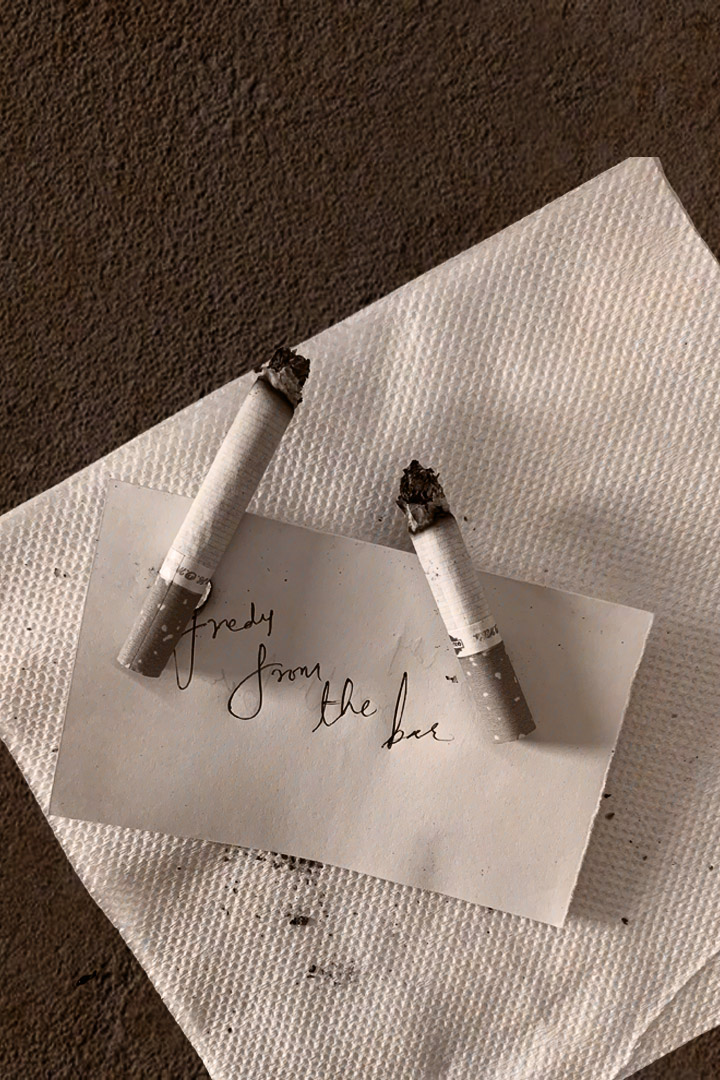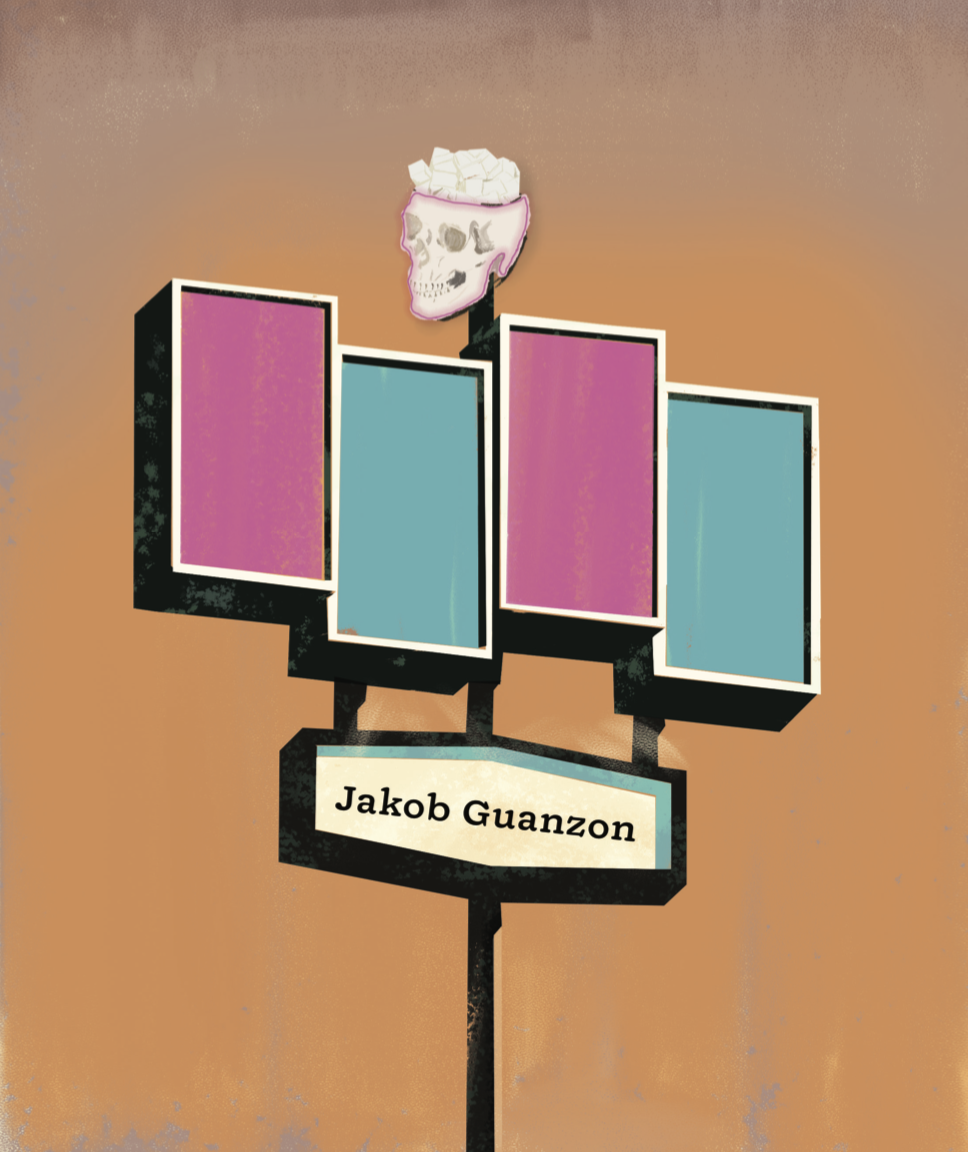I’m twenty minutes into this Muni ride toward Haight Street in San Francisco and it just registered that I’m not heading toward Haight at all. Simultaneously, I realized that the Joan Didion essay I’m reading is not on mortality, but morality. So, I’m about thirty some-odd blocks from where I’m supposed to be, evaluating how morality and mortality could be topics irreducible enough to be misconstrued, all while under the serious and unreasonable influence of caffeine.
I’m out in public because my friend Angel Dominguez has invited me to his poetry reading at some renowned house venue called “Chicken Coup” (which I hadn’t heard of ‘til then). He’s currently stuck in traffic some miles away, running late, and not answering his phone.
I decide to step off the Muni at a serene park that is probably in a Bosch painting somewhere.
There’s a group of people dancing on the tennis court near an outdoor café where another group is sipping white wine. There doesn’t appear to be any music playing, but it’s hardly hindering them as bodies move in harmony, obedient to some secret rhythm.
Sometimes I want to sit somewhere and look polite, doing polite things. I perform a little role reversal: I’m drinking white wine as some maniac continues to stare me down from the hillside. I’m thinking, what a crude thing, I hope he finds gainful employment, before petting the muscular thigh of my crossfit-fit partner. But she doesn’t look up. My smug grin remains unmet. Who’s this captivating person she’s texting? Why am I not even good enough in this fantasy?
The sound of rattling paper directs me to a flyer on a fence post promoting a silent disco at the tennis court. The flyer appears to be itching to join. I don’t have similar ambitions. Though, I guess I just anthropomorphized a flyer. Dream on…
Instead, I’m thinking about dancing mania in 14th and 17th century Europe. Was it a mass psychogenic illness induced by ergot poisoning? Or, was it staged by a pagan cult to subvert antediluvian traditions of oppression? Perhaps both were effective in allaying the stresses of living.
And, this is all it takes. Within thirty minutes, I can’t get anywhere without the excessive urge to document the patterns, images, references, narratives, and emotions that accumulate. I embark through this metropolis to find a café or bar or restaurant or whatever venue to accommodate the need to cathect onto a page.
Why is it so difficult to write in a space other than the chamber of disquiet and depression that is my room at home? The only sanctuary for these thoughts is in the tormenting cell of my survival. So I try to insert my body in public spaces to write. People notice when you’re writing though. They come and ask. They sneer. I know they’re sneering. They look over your shoulder at your computer. Once you’re in the public domain, your words and thoughts aren’t private anymore. Then you have to endure the innate competitive nature we have toward strangers. I’m not ready to defend these thoughts yet.
Even at work, twenty stories up, into the seemingly uninhabitable climate of the finance district skyscraper, I can’t go twenty minutes without trying to sneak in a paragraph or two when I sense the supervisors are looking away. At this point, everyone’s privy to it. In the editor’s newsroom you can hear my fingers typing away like some tap-dancer in a library. I try to fit the words in before the shame advances or the managers intervene. I’m running against the clock. I’m bounding across the fields at night nearing my escape before the flood lights spot me.
So, even with all the ideas brimming, I summit a hill and walk toward the meet-up location. Once I reach that area I’ll be able to put it all down. To put it all down?
On the hill, a collection of people are performing Tai Chi. It’s almost like they’re offering the expanse of the bay. A brisk wind launches my clothes behind me like a parachute deployed. My nose starts to run from the humidity. My throat dries. If I just exercised once a week… Flights of pigeons awaken from an aspen tree and murmur over a gothic spire.
My fingers are twitching at my side, as if I’m in a spaghetti western and the Sheriff’s approaching. My lip twitches. I draw a pen, the sheriff draws a notepad, and I scribe it down. Queue tumbleweed.
Eventually, I make it to our meet-up location. I walk past a pub called Finnegan’s Wake once, as if it wasn’t the obvious choice. Standing in the entry to the pub, my stomach groans. I buy a sandwich from the health food store across the street and offer the second half to an older man who’s been standing outside a hardware store this entire time, staring into the middle distance with two ragged bags by his feet. He rejects it with the wave of a hand. Embarrassed, I retreat. An older woman sneers at me. While taking a seat, I notice he’s pretty well dressed but awfully confused. He keeps staring. He’s not homeless, just senile. Still, who couldn’t use a sandwich?
Angel calls and we meet at Finnegan’s Wake after he checks in. He has a few writing friends with him. One’s a professor and poet from San Jose, one is attending NYU, and one went to Naropa with him. The fourth is a politics student. As it goes for writers, we all zero in on the politics student.
One writer: “What genre of politics do you study?”
Politics student: “International.”
Another writer: “What genre?”
Politics student: “Latin American.”
Another writer: “What genre?”
Politics student: “Revolutionary.”
Another writer: “What genre?”
Another writer: “Genre and gender share the same etymology. They’re derivative terms employed by the patriarchy.”
Another writer: “So, I already created friction with the gringo writer from Wisconsin. Her manuscript is called Under-Privileged. She was wearing a shirt with chipmunks on it. Chipmunks.”
Another writer: “I commiserate with the plight of a chipmunk.”
Politics student to another writer: “So what do you do?”
The other writer: “I don’t really do anything. I can barely say that I can do anything.”
Another writer: “Sounds exactly like a writer.”
It’s become apparent to me that we’re now those people in a beer garden. In fact, as I look around it’s now vacant besides us. Funny how unwelcome writers are in a bar called Finnegan's Wake. Meanwhile, they’re all cheering for some sport inside. There’s more people in there than there are out here. What are they doing that brings them all together?
Perhaps we are simply a nuisance. Maybe we’re the worst variety of patronage: self-important, artsy frauds. What do we have to prove for it? Nothing. Still, what else can we talk about? Nothing.
I re-enter the bar to use the bathroom. Above them the television broadcasts a bearded dude with a rifle tattoo on his forearm, pointing to the window frame of a salvaged truck.
Three beers in, we walk to the venue which is a small apartment above a sandwich shop. We climb up a flight of wooden stairs to an old Victorian living room, immediately bumping shoulders with the ten people there. We share an extended moment of judgemental stares. Standing at opposing walls of the living room, there are at least twenty more fabrics and seven more candles than there need to be. It’s a fire hazard, really. Luckily, the room’s hardly at capacity. I mean, it’s a poetry reading. The tension is real. It is picking a dance partner in a middle school P.E. class tense. On one side of the room are the cardigan-ed librarians and, on the other, the bearded, tattooed hipster poets. It’s on the verge of a really unremarkable conflict before the host’s husband walks in with a dripping clothes hanger announcing, “I’ve jimmied the toilet, may your bowels express themselves as freely as the words on your page.” Everyone laughs and applauds like it’s the worst sitcom I’d never see again.
We escape to the kitchen to find what’s left of the wall space to be occupied.
The reading starts with a writer from some upper-middle class area somewhere in the East Coast. They’re trembling and incredibly nervous. Halfway through a patient and honest account/confession of their inherited wealth, they start talking about their belt. It’s too tight and they might faint, they admit. But, with everyone rallying behind them, they go on to finish.
Next is Angel. He pays a thoughtful and endearing tribute to Kevin Killian, who passed a few days prior. He then launches into his rhythmic and erudite section of his manuscript on the recuperation of his ancestral, spiritual relationship with Yucatan. The range of reactions is always noteworthy. The nuances are impossible to judge.
Angel finishes and garners two clear fans. They each purchase one of his books. And yet, he seems preoccupied with some other thought. He never voices it, but our positive feedback doesn’t compute. Either the audience reaction or something about his delivery or content steals his attention. Which is normal. I don’t pry.
I leave shortly after giving my regards to Angel. I find myself standing outside trying to figure out how to get back to BART. The lights of the city, the speckled satellites, are beatitude in uniform.
The world slows again. I look up at the bayview window of the house venue. What a strange room. Their silhouettes sway. If I didn’t know any better, I’d swear they are dancing. Is it a mass psychogenic illness induced by ergot poisoning? Or, is it staged by a pagan cult to subvert antediluvian traditions of oppression? Perhaps both are effective in allaying the stresses of living.
I find a quiet cafe nearby. It closes in an hour. Should be enough time to put it down.





